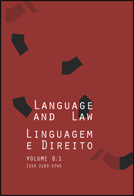Feigned incompetence
The pitfalls of evaluating Miranda comprehension in non-native speakers of English
Abstract
In 1966 the US Supreme Court ruled that custodial suspects should be advised of their rights, including the right to silence and the right to an attorney, before questioning begins. If they waive their rights and the defense can prove that they did not do so voluntarily, knowingly, and intelligently, their confession may be excluded from the evidence. Judges consider many factors in their decisions on motions to suppress, including expert testimony. In this paper, I discuss a case where two experts evaluated language proficiency of the same suspect and arrived at radically different conclusions regarding her ability to understand the warnings. I will show why one assessment was superior to the other, but the true significance of the case is in showing that a dialogic approach to delivery of the rights can reduce linguistic guesswork and help safeguard the integrity of the investigation and due process.
Downloads
Published
How to Cite
Issue
Section
License
Copyright (c) 2021 Aneta Pavlenko

This work is licensed under a Creative Commons Attribution-NonCommercial 4.0 International License.
Este trabalho está licenciado com uma Licença Creative Commons - Atribuição-NãoComercial 4.0 Internacional.






